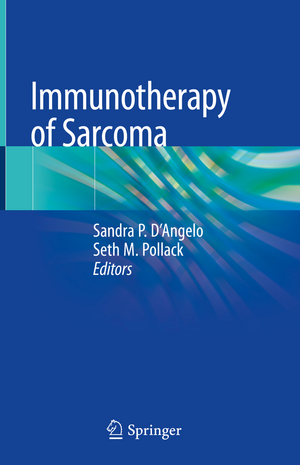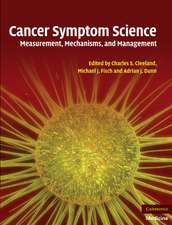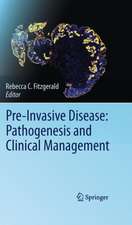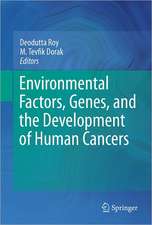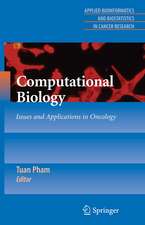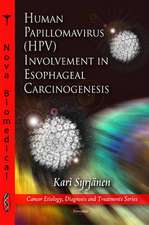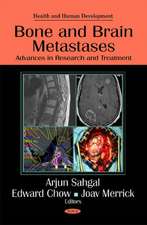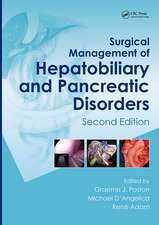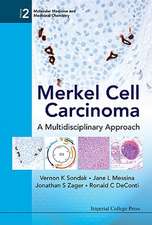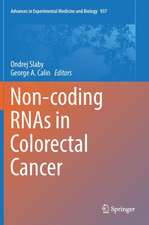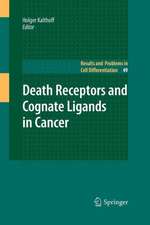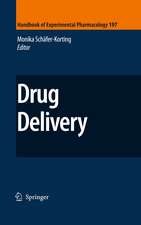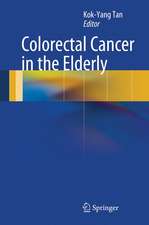Immunotherapy of Sarcoma
Editat de Sandra P. D'Angelo, Seth M. Pollacken Limba Engleză Hardback – 10 dec 2018
Preț: 559.98 lei
Preț vechi: 589.45 lei
-5% Nou
Puncte Express: 840
Preț estimativ în valută:
107.16€ • 116.37$ • 90.02£
107.16€ • 116.37$ • 90.02£
Carte tipărită la comandă
Livrare economică 19-25 aprilie
Preluare comenzi: 021 569.72.76
Specificații
ISBN-13: 9783319935294
ISBN-10: 3319935291
Pagini: 150
Ilustrații: VII, 152 p. 10 illus., 7 illus. in color.
Dimensiuni: 155 x 235 mm
Greutate: 0.45 kg
Ediția:1st ed. 2019
Editura: Springer International Publishing
Colecția Springer
Locul publicării:Cham, Switzerland
ISBN-10: 3319935291
Pagini: 150
Ilustrații: VII, 152 p. 10 illus., 7 illus. in color.
Dimensiuni: 155 x 235 mm
Greutate: 0.45 kg
Ediția:1st ed. 2019
Editura: Springer International Publishing
Colecția Springer
Locul publicării:Cham, Switzerland
Cuprins
Part 1 The Immune Sarcoma Microenvironment.- 1 MDSC, Macrophage and CD47.- 2 IDO and other inhibitory markers.- 3 Regulatory T cells.- 4 Radiation and sarcoma immunotherapy.- Part 2 Sarcoma Immunotherapeutics.- 5 Oncolytic Virus therapy.- 6 Vaccines.- 7 Immune Checkpoint Blockers.- 8 Adoptive T cell therapy.
Notă biografică
Sandra D’Angelo is a medical oncologist specializing in the care of patients with soft tissue and bone sarcoma at Memorial Sloan Kettering Cancer Center. Her goal is to develop innovative ways to use the immune system to treat these rare cancers. Over the past few years she has been the principal investigator of numerous immunotherapy clinical trials. Dr. D’Angelo has been building an immunology translational oncology program in sarcoma at Memorial Sloan Kettering Cancer Center. The basis of the program is systematically centered on the exploration of checkpoint blockade, combination strategies with checkpoint inhibitors, adoptive T cell therapy, and elucidation of biomarkers predictive of benefit to systemic immunotherapy. She is currently national principal investigator of the phase II trial of nivolumab with or without ipilimumab, conducted through the Alliance for Clinical Trials in Oncology Cooperative Group (A091401), which has great potential to advance our understanding of the application of immunotherapy in sarcoma.
Seth M. Pollack is a physician-scientist whose research is entirely focused on the development of novel immunotherapies for patients with advanced sarcoma. The Pollack Lab has a particular interest in synovial sarcoma (SS) and myxoid/round cell liposarcoma (MRCL). The Lab has demonstrated that, like SS, MRCL tumors almost always homogeneously express a protein called NY-ESO-1, which is a member of the cancer-testes antigen family with features that make it an attractive target for immunotherapy. Using clinical grade reagents, the Pollack Lab developed a methodology for isolating and expanding NY-ESO-1-specific T cells from the peripheral blood of sarcoma patients and adoptively transferring these cells to specifically kill NY-ESO-1 expressing tumor cells. In a first clinical trial, clinical anti-tumor activity was unfortunately short lived but novel mechanisms of immune evasion were identified. Now, a new first-in-man trial is being planned to address these issues. The Pollack lab has also been characterizing the sarcoma immune microenvironment. Based on new and surprising findings, the lab has designed new, open, and enrolling investigator-sponsored trials for sarcoma patients using diverse immunotherapeutic strategies.
Seth M. Pollack is a physician-scientist whose research is entirely focused on the development of novel immunotherapies for patients with advanced sarcoma. The Pollack Lab has a particular interest in synovial sarcoma (SS) and myxoid/round cell liposarcoma (MRCL). The Lab has demonstrated that, like SS, MRCL tumors almost always homogeneously express a protein called NY-ESO-1, which is a member of the cancer-testes antigen family with features that make it an attractive target for immunotherapy. Using clinical grade reagents, the Pollack Lab developed a methodology for isolating and expanding NY-ESO-1-specific T cells from the peripheral blood of sarcoma patients and adoptively transferring these cells to specifically kill NY-ESO-1 expressing tumor cells. In a first clinical trial, clinical anti-tumor activity was unfortunately short lived but novel mechanisms of immune evasion were identified. Now, a new first-in-man trial is being planned to address these issues. The Pollack lab has also been characterizing the sarcoma immune microenvironment. Based on new and surprising findings, the lab has designed new, open, and enrolling investigator-sponsored trials for sarcoma patients using diverse immunotherapeutic strategies.
Textul de pe ultima copertă
This book describes recent progress in the development of immunotherapies for advanced sarcoma, paying special attention to the potential role of manipulations of the sarcoma tumor immune microenvironment in achieving durable remissions. Readers will find a thorough overview of the state of the art in tumor immunology and immunotherapy as they relate to sarcoma. Among the topics addressed are advances in vaccine therapy; the value of adoptive transfer of cytokine-induced natural killer cells; the development of adoptive T cell strategies; and the scope for use of checkpoint inhibitors in patients with sarcoma, mirroring the tremendous breakthroughs made in other malignancies. Detailed information is provided on laboratory and clinical research, with analysis of outcomes of recent trials and identification of key challenges. There is every reason to believe that more effective and less toxic therapies for metastatic sarcoma can be attained by deepening our understanding of cancer immunology and building on the advances in immunotherapy for other solid tumors. In this context, Immunotherapy of Sarcoma will be of high interest for all medical oncologists responsible for the treatment of sarcoma patients.
Caracteristici
Describes recent progress in the development of immunotherapies for advanced sarcoma Places special emphasis on the sarcoma tumor immune microenvironment Addresses both vaccine and adoptive T cell strategies Discusses checkpoint blockade in sarcoma
